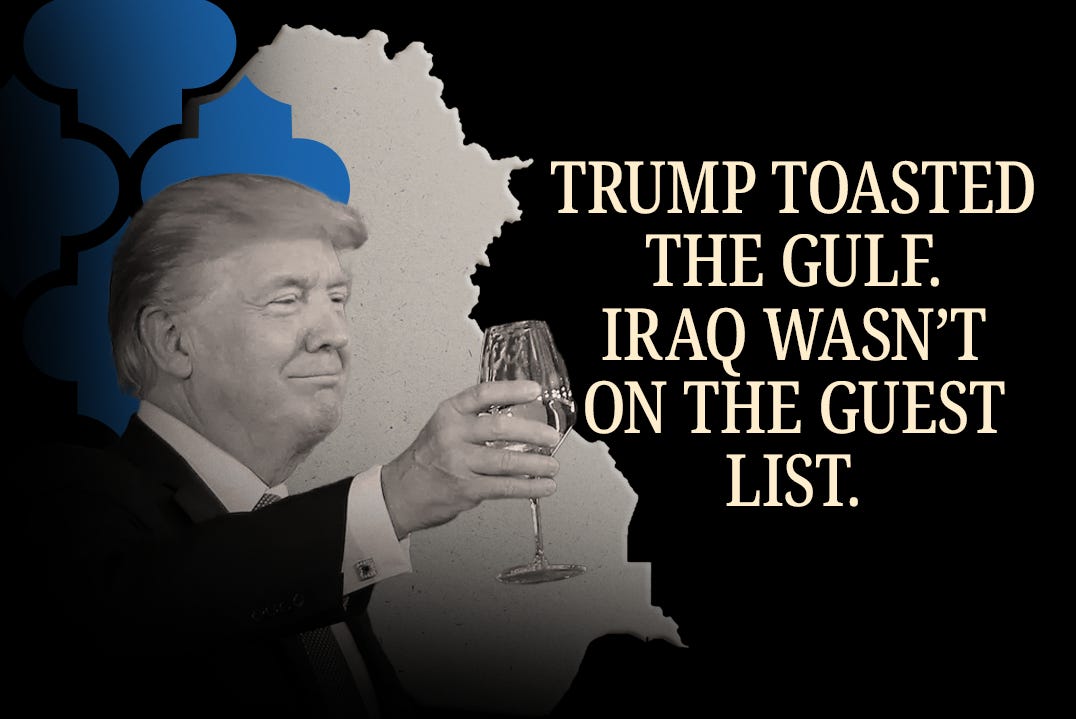Trump Toasted the Gulf. Iraq Wasn’t on the Guest List.
As Syria rebrands and the Gulf rises, Iraq is stuck in a trillion-dollar loop of failure
When Donald Trump landed in Riyadh during his 2025 Gulf tour, he didn’t bother with small talk. Standing before a hall of Saudi dignitaries and American officials, he praised Gulf leaders for their “discipline, vision, and ambition,” applauding their transformation from petro-state monarchies into global power brokers.
Then he dropped the hammer.
“Compare that to the disaster in Iraq,” he said. “Trillions spent, nothing to show.”
It was classic Trump—bombastic, self-congratulatory, and impossible to ignore. It was also, unfortunately for Iraqis like me, hard to argue with.
The Gulf has spent the last twenty years constructing towering skylines, assembling sovereign wealth portfolios, and building real diplomatic muscle. Iraq, meanwhile, has spent that same period sinking into corruption and political paralysis, stuck in Iran's unforgiving orbit.
And now, with Syria making a surprise comeback on the Arab stage—led by a former jihadist rebranded as a statesman—Iraqis are left asking a painful question:
How did we lose twenty years and get outpaced by everyone, even Damascus?
Consider this: Saudi Arabia’s Vision 2030 initiative has committed more than $600 billion to future-proof the Kingdom, funding everything from AI startups in Silicon Valley to megacities in the desert. Trump’s Riyadh stop included a $142 billion arms and tech package. Qatar, not to be outdone, reportedly offered him a $400 million private jet. Western media dubbed it “Air Force One 2.0.” The United Arab Emirates committed to investing $1.4 trillion in the United States over the next ten years. Trump signed agreements with Qatar projected to generate at least $1.2 trillion in cumulative economic activity between the two countries.
In contrast, Iraq spent $13 million on cutlery for the Arab League summit in Baghdad—yes, forks, knives, and spoons. Additional millions were spent on cosmetic upgrades to the city’s crumbling airport, where state media boasted of “fresh paint and new trees.” The airport still looks like a relic of the 1970s. And hardly anyone is planning to show up to the summit.
Arab leaders are ghosting the event. Syria’s Ahmad al-Sharaa will send his foreign minister. Iraq’s supposed allies won’t even bother with that.
Since Saddam’s fall, Iraq has raked in trillions in oil revenue. So why is there still no 24/7 electricity? Why are public hospitals out of gauze and schools missing teachers? Why do borders leak, and the dinar plummets in value?
The answer isn’t infrastructure. It’s leadership.
Iraq’s ruling class—a rotating cast of exiles, militia commanders, and sectarian bosses—treats ministries like ATM machines. Contracts are inflated, budgets siphoned, ambassadorships auctioned off. Real decisions are made not in Baghdad but in Tehran, Qom, and IRGC war rooms.
Iraq didn’t fail because of war alone. It failed because it was looted by its own.
Here’s the twist no one saw coming: Syria is being welcomed back into the Arab world. Fast.
Ahmad al-Sharaa—once Abu Mohammad al-Joulani, commander of an Al-Qaeda affiliate—is now wearing tailored suits and hosting Gulf officials. He promises elections. He talks reform. He shakes Trump’s hand.
It’s a rebrand, yes. But it’s working.
The Gulf, which once armed rebels to oust Assad, is now offering reconstruction funds. Sanctions are being relaxed. Syria is sliding back into the Arab League. Not because it changed, but because it adapted.
Iraq, meanwhile, is stuck. It held elections, allied with the West, and fought jihadists, but somehow ended up ignored.
Syria, for all its brutality, is playing the game. Iraq is still arguing over the rulebook.
A big part of Iraq’s dysfunction lies in its self-image. Thanks to Iran’s influence, the country views itself as part of the “Axis of Resistance” alongside Hezbollah, the Houthis, and, until recently, Assad’s Syria. It’s a political cosplay with no strategic logic.
Resisting whom? Iraq has no border with Israel. American troops are still in the country because Iraqi leaders can’t agree on how to replace them. What Iraq’s “resistance” really resists is accountability. It outsources sovereignty and calls it defiance. It preaches dignity and delivers dysfunction.
In diplomacy, attendance is everything. When Assad was isolated, no one invited him anywhere. That’s what real consequences look like.
Now that Syria is signaling alignment with Gulf goals and American expectations, doors are opening. Meanwhile, Iraq hosts a regional summit and gets a table of junior ministers and no-shows.
Translation: you don’t matter.
Turns out you can’t buy respect with expensive cutlery.
Iraq’s youth aren’t fooled by speeches. They’ve grown up watching Dubai rise and Doha expand. They’ve seen Syria, literally bombed into the Stone Age, find a way back into the room. They watch their leaders take private jets while clinics run dry. They see more order in foreign embassies than in their own ministries. They know where real power lies, and it’s not in Baghdad’s cabinet meetings.
What Iraqis want is simple. They want passports that don’t embarrass them. Governments that function. Leaders who don’t steal. They want what the Gulf built: not the slogans, but the substance.
Trump’s Riyadh speech wasn’t just a pat on the back. It was a warning shot.
The region is moving. Deals are being made. The Arab world is realigning—with or without Iraq. If the country doesn’t confront its decay, it won’t just be left behind.
It’ll be left out altogether.
Middle East Uncovered is powered by Ideas Beyond Borders. The views expressed in Middle East Uncovered are those of the authors and do not necessarily reflect the views of Ideas Beyond Borders.



Correction: $400* million. Great take!